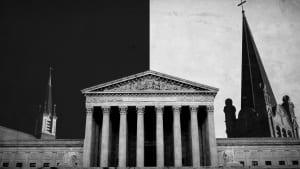SCOTUS sides with liberalism in Fulton v. Philadelphia

At a time when American politics from top to bottom is sharply and rancorously divided, a unanimous Supreme Court decision on a case wrapped up with the country's culture wars is a rare thing. Fulton v. City of Philadelphia is certainly such a case. But the decision, announced Thursday morning, is also a very good thing — for the plaintiffs, of course, but also for American liberalism, rightly understood.
The case involved a Catholic social services organization that sued Philadelphia after the city excluded it from a foster-care program due to the organization's refusal to certify same-sex couples as foster parents. Conservative justices Samuel Alito, Clarence Thomas, and Neil Gorsuch were prepared to issue a sweeping decision that overturned Employment Division v. Smith, a 1990 decision authored by Antonin Scalia that made it more difficult for religious people and groups to secure exemptions from generally applicable laws. (Justices Stephen Breyer, Brett Kavanaugh, and Amy Coney Barrett are also eager to see Smith go, but seem less certain about what should replace it.)
To avoid a sweeping outcome that likely would have forced the court's liberal justices into dissent, Chief Justice John Roberts appears to have settled on a narrower ruling against the city of Philadelphia — one that could secure their support. That kind of consensus-building on the high court, with a potentially divisive case decided narrowly and with the broadest possible consensus, is a welcome model of how to govern in a dangerously polarized time.
But the larger reason why the decision deserves praise is that it upholds a key principle of political liberalism. The First Amendment protects the free exercise of religion. Such exercise is not limited to individuals attending church or praying in private homes. It's a freedom of those individuals to join together and associate with others of their faith in civil society. That includes the freedom of a Catholic social service agency to facilitate adoptions, even when the foundational beliefs undergirding that agency preclude facilitating adoptions for same-sex couples.
To insist that such organizations set aside their foundational beliefs when they clash with the moral convictions of ideological progressivism — or, in the language of Fulton decision, to force a Catholic organization "to curtail its mission or to certify same-sex couples as foster parents in violation of its religious beliefs" — is an act of illiberalism. That's because it amounts to insisting not just that the state but also private religious entities must uniformly affirm a comprehensive moral view different from and in conflict with their own as the price of entering the public square. That effectively turns the country into a political community with an established church of progressive moral absolutism.
Liberalism is, or should be, an ideology open to a rich and vibrant pluralism. Which is exactly what the Supreme Court has affirmed in its decision in Fulton v. City of Philadelphia.
You may also like
Bernie Sanders wants to know if cannabis reporter is 'stoned' right now
Trevor Noah and Jimmy Kimmel aren't super impressed with Marjorie Taylor Greene's Holocaust apology

 Yahoo Movies
Yahoo Movies 